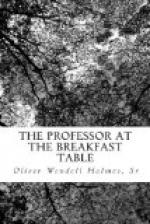“A vast vacuity! all
unawares,
Fluttering his pennons
vain, plumb down he drops
Ten thousand fathom
deep.”
But think of the Old World,—that part of it which is the seat of ancient civilization! The stakes of the Britons’ stockades are still standing in the bed of the Thames. The ploughman turns up an old Saxon’s bones, and beneath them is a tessellated pavement of the time of the Caesars. In Italy, the works of mediaeval Art seem to be of yesterday,—Rome, under her kings, is but an intruding newcomer, as we contemplate her in the shadow of the Cyclopean walls of Fiesole or Volterra. It makes a man human to live on these old humanized soils. He cannot help marching in step with his kind in the rear of such a procession. They say a dead man’s hand cures swellings, if laid on them. There is nothing like the dead cold hand of the Past to take down our tumid egotism and lead us into the solemn flow of the life of our race. Rousseau came out of one of his sad self-torturing fits, as he cast his eye on the arches of the old Roman aqueduct, the Pont du Gard.
I am far from denying that there is an attraction in a thriving railroad village. The new “depot,” the smartly-painted pine houses, the spacious brick hotel, the white meeting-house, and the row of youthful and leggy trees before it, are exhilarating. They speak of progress, and the time when there shall be a city, with a His Honor the Mayor, in the place of their trim but transient architectural growths. Pardon me, if I prefer the pyramids. They seem to me crystals formed from a stronger solution of humanity than the steeple of the new meeting-house. I may be wrong, but the Tiber has a voice for me, as it whispers to the piers of the Pons Alius, even more full of meaning than my well-beloved Charles eddying round the piles of West Boston Bridge.
Then, again, we Yankees are a kind of gypsies,—a mechanical and migratory race. A poet wants a home. He can dispense with an apple-parer and a reaping-machine. I feel this more for others than for myself, for the home of my birth and childhood has been as yet exempted from the change which has invaded almost everything around it.
—Pardon me a short digression. To what small things our memory and our affections attach themselves! I remember, when I was a child, that one of the girls planted some Star-of-Bethlehem bulbs in the southwest corner of our front-yard. Well, I left the paternal roof and wandered in other lands, and learned to think in the words of strange people. But after many years, as I looked on the little front-yard again, it occurred to me that there used to be some Star-of-Bethlehems in the southwest corner. The grass was tall there, and the blade of the plant is very much like grass, only thicker and glossier. Even as Tully parted the briers and brambles when he hunted for the sphere-containing cylinder that marked the grave of Archimedes, so did I comb the grass with my fingers for my monumental memorial-flower. Nature had stored my keepsake tenderly in her bosom; the glossy, faintly streaked blades were there; they are there still, though they never flower, darkened as they are by the shade of the elms and rooted in the matted turf.




